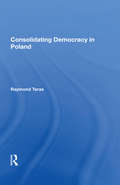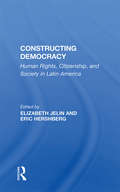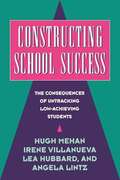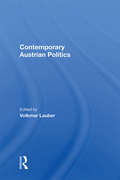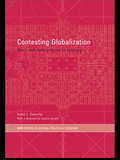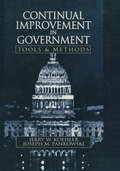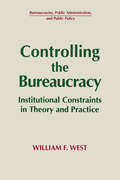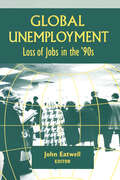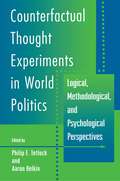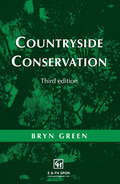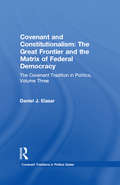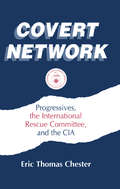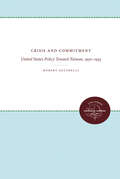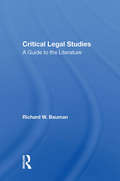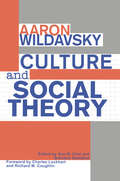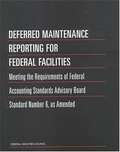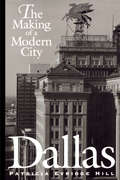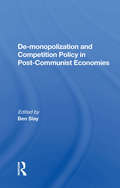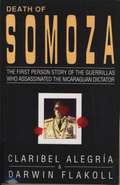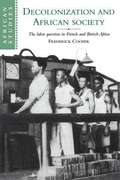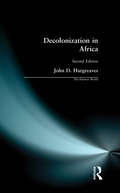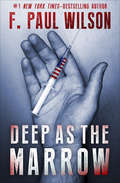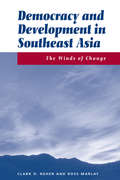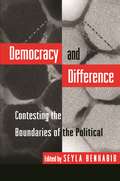- Table View
- List View
Consolidating Democracy In Poland
by Raymond TarasA comprehensive analysis of politics in a young European democracy, this book describes the principal features of Poland's democratic system-the political institutions, parties, elections, and leaders that have shaped the transition from communism. Raymond Taras examines the complex Walesa phenomenon; the comeback of the communists; and the uneasy
Constructing Democracy: Human Rights, Citizenship, And Society In Latin America
by Elizabeth JelinIn this pathbreaking contribution to debates about human rights, democracy, and society, distinguished social scientists from Latin America and the United States move beyond questions of state terror, violence, and similar abuses to embrace broader concepts of human rights: citizenship, identity, civil society, racism, gender discrimination, and po
Constructing School Success: The Consequences of Untracking Low Achieving Students
by Angela Lintz Lea Hubbard Irene Villanueva Hugh MehanBolstering the academic success of low achieving students and providing a more egalitarian classroom setting are two constant challenges to our schools. This book describes the process of "untracking", an educational reform effort that has prepared students from low income, linguistic and ethnic minority backgrounds for college. Untracking offers all students the same academically-demanding curriculum while varying the amount of institutional support they receive. This book is a highly readable account of a successful school reform effort. It provides systematic research results concerning the educational and social consequences of untracking previously low achieving students, and will be of great importance to researchers in educational and social psychology.
Contemporary Austrian Politics
by Volkmar LauberLong characterized by stability--even rigidity--Austrian politics is becoming more dynamic and combative. Tracing the disruption of the "postwar pattern" in Austria, this book explores the recent dramatic evolution in Austria's political system. The contributors examine the decline of the established Social Democratic and Conservative parties and c
Contesting Globalization: Space and Place in the World Economy (RIPE Series in Global Political Economy)
by André C. DrainvilleContesting Globalization makes an innovative and original addition to the literature on globalization examining the challenges faced by those wishing to develop progressive visions of transparent global governance and civil society. This new study closely traces the history and development of the institutions of global governance (The World Bank, IMF, WTO etc.) as well as the emergence of the anti-globalization movement. The author argues that we are at a unique moment where social forces have moved from national and international struggles to a global struggle and intervention in the world economy. A series of case studies examine the ways in which cities have become contested sites for global struggles from the London dockworkers strikes of the nineteenth century to the recent demonstrations against the international financial institutions in Genoa, Seattle and Washington.
Continual Improvement in Government Tools and Methods
by Jerry W. KoehlerKey to the success of quality implementation is the understandingteam members have of the process and the tools to be used. Continual Improvement in Government: Tools and Methods was designed to provide users with a complete description and practical examples of these tools and viable techniques that will benefit teams. This book examines the four most popular tools: flowcharting; cause and effect diagrams; Pareto charts; and histograms-and shows how to apply them in the public service sector.To improve processes requires effective decision-making and effective decision-making begins with accurate data. Koehler and Pankowski dispel the myths and fears of data collection and analysis. In a step-by-step approach, they lead you through the very heart of Quality Management...DATA. Continual Improvement in Government: Tools and Methods provides an understandable format that explains the importance of data, the differences in the quality of data, why it is collected, and how it is used.
Controlling the Bureaucracy: Institutional Constraints in Theory and Practice (Bureaucracies, Public Administration, And Public Policy Ser.)
by William F. WestControls on the bureaucracy through administrative due process and presidential and congressional prerogatives are the focus of this book. The author examines these controls and assesses the trade-offs among them.
Coping with Global Unemployment: Putting People Back to Work
by John EatwellA collection of papers that address unemployment as a social phenomenon. It suggests there are solutions if society is willing to take the steps necessary to find and implement them. Focus is on the persistent unemployment in the USA and the UK.
Counterfactual Thought Experiments in World Politics: Logical, Methodological, and Psychological Perspectives
by Philip E. Tetlock Aaron BelkinPolitical scientists often ask themselves what might have been if history had unfolded differently: if Stalin had been ousted as General Party Secretary or if the United States had not dropped the bomb on Japan. Although scholars sometimes scoff at applying hypothetical reasoning to world politics, the contributors to this volume--including James Fearon, Richard Lebow, Margaret Levi, Bruce Russett, and Barry Weingast--find such counterfactual conjectures not only useful, but necessary for drawing causal inferences from historical data. Given the importance of counterfactuals, it is perhaps surprising that we lack standards for evaluating them. To fill this gap, Philip Tetlock and Aaron Belkin propose a set of criteria for distinguishing plausible from implausible counterfactual conjectures across a wide range of applications. The contributors to this volume make use of these and other criteria to evaluate counterfactuals that emerge in diverse methodological contexts including comparative case studies, game theory, and statistical analysis. Taken together, these essays go a long way toward establishing a more nuanced and rigorous framework for assessing counterfactual arguments about world politics in particular and about the social sciences more broadly.
Countryside Conservation: Land Ecology, Planning and Management
by Bryn GreenThis third edition of the standard text Countryside Conservation charts and evaluates those changes which represent a fundamental revolution in the ways in which the countryside is planned and managed. It sets out the principles, policies and practice which underlie the ecology, planning and management of the new countryside, discussing ways in which countryside conservation objectives are evolving and how they can best be achieved.
Covenant and Constitutionalism: The Covenant Tradition in Politics (Covenant Traditions in Politics Series)
by Daniel ElazarThis volume traces the trends and the developing relationships of constitutionalism and covenant that ultimately led to the transformation of the latter into the former. Elazar explores the paths that emerged out of the constitutionalized covenantal tradition in Europe such as federalism, communitarianism, and the cooperative movement.
Covert Network: Progressives, the International Rescue Committee and the CIA
by Eric Thomas ChesterThis book tells the story of the International Rescue Committee (IRC), the largest nonsectarian refugee relief agency in the world. Founded in the 1930s by socialist militants, the IRC attracted the support of renowned progressives such as Eleanor Roosevelt, Norman Thomas, and Reinhold Niebuhr. But by the 1950s it had been absorbed into the American foreign policy establishment. Throughout the Cold War, the IRC was deeply involved in the volatile confrontations between the two superpowers and participated in an array of sensitive clandestine operations. The IRC thus evolved from a small organization of committed activists to a global operation functioning as one link in the CIA's covert network.
Crisis and Commitment: United States Policy Toward Taiwan, 1950-1955
by Robert AccinelliThis analytical study examines in comprehensive detail the making of the American military and political commitment to Taiwan during the first half of the 1950s. Starting with President Truman's declaration in January 1950 that the United States would not militarily assist Taiwan's Nationalist Chinese government, Robert Accinelli shows why Washington subsequently reversed this position and ultimately chose to embrace Taiwan as a highly valued ally. Accinelli analyzes this critical reversal within the context of shifting international circumstances and domestic developments such as McCarthyism and the Truman-MacArthur controversy. In addition to describing the growth of a close but uneasy relationship between the United States and the Nationalist regime, he focuses on the importance of the Taiwan issue in America's relations with the People's Republic of China and Great Britain. He concludes his study with an analysis of the 1954-55 confrontation between the United States and China over Quemoy and Matsu and other Nationalist-held offshore islands. According to Accinelli, neither the Korean War nor the Indochina War divided the United States and China more fundamentally during this period than did the issue of U.S.-Taiwanese relations.Originally published in 1996.A UNC Press Enduring Edition -- UNC Press Enduring Editions use the latest in digital technology to make available again books from our distinguished backlist that were previously out of print. These editions are published unaltered from the original, and are presented in affordable paperback formats, bringing readers both historical and cultural value.
Critical Legal Studies: A Guide To The Literature
by Richard W BaumanContemporary legal thought has been powerfully influenced by Critical Legal Studies, a school of legal scholars whose work has sustained a continuing radical critique of established legal doctrines. In this essential reference work, Richard Bauman presents the most thorough, up-to-date guide available for this essential literature. In addition to providing the basic bibliographic information, Bauman offers a set of effective introductions to contextualize and explain the work being surveyed. He has created a fundamental handbook not only for the law but also for politics and radical thought.
Culture and Social Theory
by Aaron WildavskyAaron Wildavsky, along with Mary Douglas, identified what they called grid-group theory. Wildavsky began calling this "cultural theory," and applied it to an astounding array of subjects. The essays in this volume exemplify the theory's potential contributions to three seemingly disparate, but related, areas: the social construction of meaning, normative/analytic political philosophy, and a theory of rational choices. This book is the first in a series of Aaron Wildavsky's collected writings being published posthumously by Transaction. Wildavsky selected, sequenced, and grouped all but three of the essays included in Culture and Social Theory prior to his death. Some are presented here for the first time. Wildavsky's cultural theory provides ways to organize and interpret the world.In the first section, he shows how social scientists, particularly economists and sociologists, apply the theory. Wildavsky argues that concepts such as externalities, public goods, altruism, and even risk and rape are tools of rival, ubiquitous cultures engaged in perpetual struggle with one another. The second section deals with cultural theory as a way to interpret the works of normative and analytic political philosophers, including Thomas Hobbes and John Stuart Mill, on competing human objectives. Wildavsky argues that particular types of interaction among a society's cultures are necessary for effective realization of basic concepts such as democracy. In the third section, Wildavsky applies cultural theory in conjunction with instrumental rationality, the former as a theory of preference formation, the latter as a device for realizing preferences efficiently. High-priority objectives, and thus the character of norms and rational action, shift across cultures. The world and its various elements comprise a complex, frequently changing, and thus ambiguous reality, nowhere more so than in the dynamic contours of the United States. For cultural theory, individualistic, hierarchical, and egalitarian interpretations of the world are the only ones capable of forming and sustaining institutions and related patterns of social relations that will support human social groups.Wildavsky's central objective is to strip away the camouflage and to reveal varying domains of social life as fields of cultural competition. Culture and Social Theory will be a necessary addition to the libraries of political scientists, economists, and policymakers, not to mention all those who admire Aaron Wildavsky and his work.
DEFERRED MAINTENANCE REPORTING FOR FEDERAL FACILITIES: Meeting the Requirements of Federal Accounting Standards Advisory Board Standard Number 6, as Amended
by Federal Facilities Council Standing Committee on Operations MaintenanceInformation on Deferred Maintenance Reporting for Federal Facilities
Dallas: The Making of a Modern City
by Patricia Evridge HillFrom the ruthless deals of the Ewing clan on TV's "Dallas" to the impeccable customer service of Neiman-Marcus, doing business has long been the hallmark of Dallas. Beginning in the 1920s and 1930s, Dallas business leaders amassed unprecedented political power and civic influence, which remained largely unchallenged until the 1970s. In this innovative history, Patricia Evridge Hill explores the building of Dallas in the years before business interests rose to such prominence (1880 to 1940) and discovers that many groups contributed to the development of the modern city. In particular, she looks at the activities of organized labor, women's groups, racial minorities, Populist and socialist radicals, and progressive reformers-all of whom competed and compromised with local business leaders in the decades before the Great Depression. This research challenges the popular view that business interests have always run Dallas and offers a historically accurate picture of the city's development. The legacy of pluralism that Hill uncovers shows that Dallas can accommodate dissent and conflict as it moves toward a more inclusive public life. Dallas will be fascinating and important reading for all Texans, as well as for all students of urban development.
Dante: Monarchy
by Prue ShawThis is the first new translation for forty years of a fascinating work of political theory, until now only available in academic libraries. Dante's Monarchy addresses the fundamental question of what form of political organization best suits human nature; it embodies a political vision of startling originality and power, and illuminates the intellectual interests and achievements of one of the world's great poets. Prue Shaw's translation is accompanied by a full introduction and notes, which provide a complete guide to the text, and places Monarchy in the context of Dante's life and work.
De-monopolization And Competition Policy In Post-communist Economies
by Ben SlayEven in developed capitalist economies, markets function poorly without regulation by competitive forces. The countries that once were part of the Eastern bloc are introducing market forces into industries created according to the monopolistic logic of central planning, so that competition policy plays an important role in the transition to capitalism. This interdisciplinary study examines how barriers to the development of competitive markets and competition policy are being overcome in Russia, Poland, Hungary, and Mongolia. A group of U.S., Russian, and East European specialists explores the institutions and programs of competition policy as well as its role in the overall post-Communist transition. Providing a complete, comparative picture of the development of competition policy in a broad cross section of formerly socialist countries, the contributors consider the extent of the post-Communist monopoly problem as well as progress in de-monopolization.
Death of Somoza: The First-person Story of the Guerrillas Who Assassinated the Nicaraguan Dictator
by Claribel Alegría Darwin J. FlakollDeath of Somoza reveals the inside story of the assassination of Somoza in Asuncion, Paraguay in 1980. Alegria and Flakoll, on the recommendation of Julio Cortazar, met "Ramon," a leader in the Argentinian Revolutionary Workers' Party (PRT) and with his help were able to interview all the survivors of the commando team that carried out the "bringing to justice" of Somoza. Alegria and Flakoll then rewove these testimonies into a narrative that reads like a thriller, as well as giving a vivid picture of the political and social climate of the time. Enlivened by its colorful cast of characters, Death of Somoza is the definitive account of how Anastasio Somoza Debayle was brought to justice. This story is not an apology for terrorism, but rather the chronicle of a tyrannicide.
Decolonization and African Society: The Labor Question In French and British Africa (African Studies #89)
by Frederick CooperThis detailed and authoritative volume changes our conceptions of 'imperial' and 'African' history. The author gathers a vast range of archival sources in French and English to achieve a truly comparative study of colonial policy toward the recruitment, control, and institutionalization of African labor forces from the mid 1930s, when the labor question was first posed, to the late 1950s, when decolonization was well under way. The author explores colonial conceptions of the African worker and shows how African trade union and political leaders used the new language of social change to claim equality and a share of power. This helped to persuade European officials that the 'modern' Africa they imagined was unaffordable. Britain and France could not reshape African society. As they left the continent, the question was how they had affected the ways in which Africans could reorganize society themselves.
Decolonization in Africa (The Postwar World)
by John D. HargreavesJohn Hargreaves examines how the British, French, Belgian, Spanish and Portuguese colonies in tropical Africa became independent in the postwar years, and in doing so transformed the international landscape. African demands for independence and colonial plans for reform - central to the story - are seen here in the wider context of changing international relationships.
Deep as the Marrow
by F. Paul WilsonThe New York Times–bestselling author of The Select “combines medical and political intrigue into one explosive, warp-speed thriller” (Douglas Preston). To end the war on drugs, the president of the United States decides to legalize narcotics—and tax them heavily. Some think he’s crazy. Others want him dead. The president’s personal physician, John Van Duyne, took an oath to do no harm, but after a Colombian drug lord kidnaps his six-year-old daughter, he’s forced to do the unthinkable to save her: poison the president.
Democracy And Development In Southeast Asia: The Winds Of Change
by Clark NeherExploring the remarkable political and economic changes sweeping Southeast Asia, the authors take as their starting point the trend,albeit uneven,toward democratization. They focus specifically on Asian democracy,'" a form that has been adapted by Southeast Asians to suit their own particular needs.This book begins by building a framework for understanding democracy in its broadest sense. The authors investigate the uniquely Asian style of democracy, which borrows democratic political institutions and meshes them with the cultural patterns specific to each country. In separate chapters, the authors trace the evolutionary historical processes within each country, as well as citizen participation, electoral practices, and civil liberties. The chapters end with an assessment of the prospects for democracy in that nation as well as an evaluation of whether democratic regimes are necessary for developing successful economies and societies in the new international era.
Democracy and Difference: Contesting the Boundaries of the Political
by Seyla BenhabibThe global trend toward democratization of the last two decades has been accompanied by the resurgence of various politics of "identity/difference." From nationalist and ethnic revivals in the countries of east and central Europe to the former Soviet Union, to the politics of cultural separatism in Canada, and to social movement politics in liberal western-democracies, the negotiation of identity/difference has become a challenge to democracies everywhere. This volume brings together a group of distinguished thinkers who rearticulate and reconsider the foundations of democratic theory and practice in the light of the politics of identity/difference. In Part One Jürgen Habermas, Sheldon S. Wolin, Jane Mansbridge, Seyla Benhabib, Joshua Cohen, and Iris Marion Young write on democratic theory. Part Two--on equality, difference, and public representation--contains essays by Anne Phillips, Will Kymlicka, Carol C. Gould, Jean L. Cohen, and Nancy Fraser; and Part Three--on culture, identity, and democracy--by Chantal Mouffe, Bonnie Honig, Fred Dallmayr, Joan B. Landes, and Carlos A. Forment. In the last section Richard Rorty, Robert A. Dahl, Amy Gutmann, and Benjamin R. Barber write on whether democracy needs philosophical foundations.
